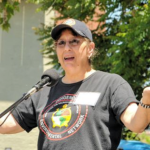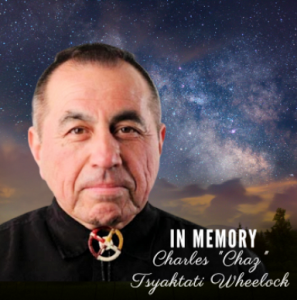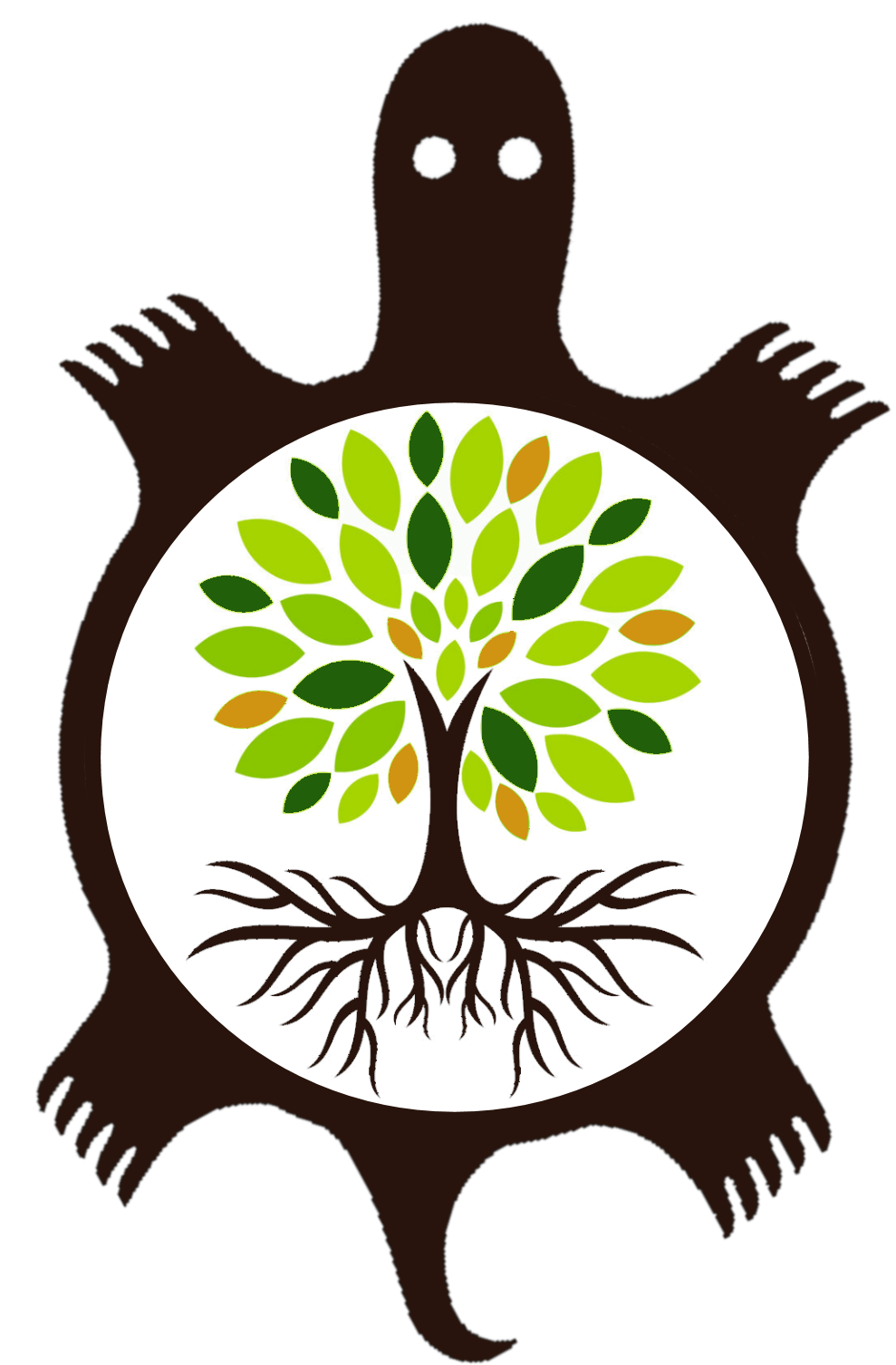The Indigenous Environmental Network is a founding member of the Campaign to Stop GE Trees.
Please check out the website of the International Campaign to Stop GE Trees – We maintain some of the same information, however, we also rely on our partners to provide additional valuable references as we work to protect the precious biodiversity that only healthy standing forests provide us all. Campaign to Stop GE Trees: http://stopgetrees.org
Brenda Jo (BJ) McManama – Campaign Organizer
 BJ, has been involved with Indigenous and environmental issues for over 30 years. Beginning in the early 1990s she worked with WV State agencies on NAGPRA issues, actively opposed mountaintop/strip coal mining, and worked with public education officials to provide comprehensive Native American history and current events to high school curriculum. For the past 16+ years she has contributed to IEN’s mission in different capacities ranging from writing, graphic design/ web administration to media coordination and team member, front line campaigner, and campaign organizer. BJ began her journey with IEN as one member of two Indigenous delegations who traveled to the jungles of Peru and central Mexico to meet with Indigenous communities. The focus of these exchanges was to share cultural information and shared experiences for the mitigation of threats to, and restoration of traditional fish stocks. Indigenous Peoples from the North and South share many of the same challenges to protect, and restore traditional forest and aquatic resources that continue to be exploited by an ever expanding economy based on natural resource extraction. BJ is a member of the Campaign to Stop GE Trees and local network steering committees with both Indigenous and Front Line community organizations on education and outreach centered on issues of environmental and climate justice, threats connected to genetic engineering and rights of nature, identification and opposition to false solutions to climate change, and rights of self-determination wherever threatened. BJ lives with her husband, daughter, granddaughter, and five rescue cats in North Central West Virginia / Appalachia which is the historical territory of the Haudenasaunee, Shawnee, Cherokee, Mingo, Lenape Peoples, and other removed by encroaching settlers and the U.S. government/military during the Civil War to make way for railways, logging and mining industries.
BJ, has been involved with Indigenous and environmental issues for over 30 years. Beginning in the early 1990s she worked with WV State agencies on NAGPRA issues, actively opposed mountaintop/strip coal mining, and worked with public education officials to provide comprehensive Native American history and current events to high school curriculum. For the past 16+ years she has contributed to IEN’s mission in different capacities ranging from writing, graphic design/ web administration to media coordination and team member, front line campaigner, and campaign organizer. BJ began her journey with IEN as one member of two Indigenous delegations who traveled to the jungles of Peru and central Mexico to meet with Indigenous communities. The focus of these exchanges was to share cultural information and shared experiences for the mitigation of threats to, and restoration of traditional fish stocks. Indigenous Peoples from the North and South share many of the same challenges to protect, and restore traditional forest and aquatic resources that continue to be exploited by an ever expanding economy based on natural resource extraction. BJ is a member of the Campaign to Stop GE Trees and local network steering committees with both Indigenous and Front Line community organizations on education and outreach centered on issues of environmental and climate justice, threats connected to genetic engineering and rights of nature, identification and opposition to false solutions to climate change, and rights of self-determination wherever threatened. BJ lives with her husband, daughter, granddaughter, and five rescue cats in North Central West Virginia / Appalachia which is the historical territory of the Haudenasaunee, Shawnee, Cherokee, Mingo, Lenape Peoples, and other removed by encroaching settlers and the U.S. government/military during the Civil War to make way for railways, logging and mining industries.
Email: bjmcmanama@ienearth.org / saveourroots@ienearth.org
Campaign to STOP GE Trees - Steering & GJEP Staff
The Campaign to STOP GE Trees is a national and international alliance of organizations that have united toward the goal of prohibiting the ecologically and socially devastating release of genetically engineered trees into the environment.
Global Justice Ecology Project coordinates, administrates and fundraises for the campaign. World Rainforest Movement, based in Uruguay, is the Southern Contact for the Campaign and has materials in English, Spanish and Portuguese.
Members of the Campaign to STOP GE Trees Steering Committee:
World Rainforest Movement has been involved in addressing the threats of GE trees since 2004, when they produced the report: “Genetically Modified Trees: The Ultimate Threat to Forests.”
In 2005 WRM, Global Forest Coalition, and Global Justice Ecology Project organized a joint workshop on GE trees for activists and Indigenous Peoples from across South America. The workshop was held in Vitoria, Brazil and included field trips to Indigenous Guarani and Tupinikim communities who were taking their land back from industrial eucalyptus plantations operated by Aracruz Cellulose.
In 2007 WRM produced an updated report entitled Transgenic Trees.
They keep abreast of GE trees developments around the Global South, and have a network of hundreds of organizations throughout the Global South with whom they work to stop deforestation and monoculture timber plantations. In 2008 they produced “GE Trees: A Country by country Overview” detailing current developments with GE trees. This publication is currently being updated.
Winnie Overbeek, the Executive Secretary of World Rainforest Movement, sits on the Steering Committee of the Campaign. Winnie is a long-time Brazil-based activist and is an expert in the dangers of industrial eucalyptus plantations. He has long been closely connected to the anti-plantation Green Deserts Movement in Brazil. He speaks English, Spanish and Portuguese.
Brenda Jo (BJ) McManama
Indigenous Environmental Network
SAVE OUR ROOTS – Stop GE Trees on Native Lands
Campaign Organizer
BJ McManama has been involved with Indigenous and environmental issues for the past 20 years. For the past nine years she has and currently works with IEN in different capacities ranging from graphic design/ web administration to media coordinator. BJ was also a member of two IEN delegations who traveled to the jungles of Peru and central Mexico to meet with Indigenous community leaders. The focus of these exchanges was to share cultural information and current shared mitigation, restoration, and subsistence challenges centered on forest and aquatic regions. When not working on national and global environmental issues, BJ participates with local environmental and social justice organizations whose focuses include maintaining food security and safety, and protecting water resources and forests from encroaching extractive industries.
The Indigenous Environmental Network has brought together and organized with Indigenous Peoples and communities globally on issues related to Indigenous land rights and autonomy. Most recently IEN has focused on the impacts of energy corporations on Indigenous communities in North America; and on the impacts of land grabbing and forest carbon offsets schemes on Indigenous communities in North America and globally.
Cell: 828-777-4882
Email: stopgetrees@ienearth.org
Lucy Sharratt, Coordinator
Canadian Biotechnology Action Network (CBAN)
Lucy Sharratt, Coordinator
Canadian Biotechnology Action Network (CBAN)
Collaborative Campaigning for Food Sovereignty and Environmental Justice
Suite 206, 180 Metcalfe Street
Ottawa, Ontario, Canada, K2P 1P5
Phone: 613 241 2267 ext. 25
Fax: 613 241 2506
coordinator@cban.ca
Dr. Rachel Smolker
Co-Director Biofuelwatch
Rachel Smolker, co-director of Biofuelwatch (BFW) is an active member of the Campaign to Stop GE Trees Steering Committee. Smolker has a Ph.D. in biology.
Biofuelwatch works to oppose GE trees as part of their effort to resist industrial and commercial scale bioenergy, which seeks to use crops and trees as feedstocks in the manufacture of so-called renewable energy. The massive amount of land needed to produce sufficient quantities of this alternative fuel, however, is driving massive deforestation and land grabs around the world. GE trees are being engineered to facilitate production of these fuels.
BFW aims to provide a bridge to science that is useful to activists.
Dr. Ricarda Steinbrecher
Co-Director EcoNexus
Dr. Steinbrecher is the Co-Director of EcoNexus, and organization of scientists in Europe. She is a molecular geneticist and developmental biologist. She has a PhD from the University of London, UK, and a first class honors M.Sc. from the University of Kiel, Germany (1985).
Since 1995 she has been working on GMOs, their risks and potential consequences on health, food security, agriculture, biodiversity and ecosystems, with a particular focus on GE trees, mosquitoes and terminator technology. She co-authored several reports and documents on GE trees which are found on the EcoNexus website.
She is advisor and consultant to many national and international organizations and processes and has acted as scientific expert in governmental and public consultations and court cases. She collaborates and works alongside civil society organizations, women’s organizations and farmers’ groups in the global North and South, in particular Asia.
She has been closely involved with the UN-led international negotiations and implementation of the Cartagena Protocol on Biosafety of genetically modified organisms since 1995 and serves on its Ad Hoc Technical Expert Group (AHTEG) on Risk Assessment and Risk Management of Genetically Modified Organisms.
She is a member of the Federation of German Scientists and a founder member of the European Network of Scientists for Social and Environmental Responsibility.
Verónica González, OLCA (Chile)
OLCA, the Latin American Observatory of Environmental Conflicts, is an organization that supports communities facing socio-environmental conflict, caused by the predatory economic model imposed in the rural territories.OLCA promotes participation and collective activism, the systematization and exchange of experiences and knowledge, the articulation and development of processes of identity assessment, with a gender and rights perspective. In this way, OLCA promotes alternative development models, which are at the service of life, ecosystems, and the communities and peoples that inhabit them.
Claire Bleakley, GE Free New Zealand
Claire Bleakley is the Coordinator of GE Free New Zealand.
Theresa Church, GE Trees Coordinator, Global Justice Ecology Project (U.S.)
Theresa Church is the Assistant Director for Global Justice Ecology Project (GJEP) and is on the Campaign to Stop GE Trees Steering Committee. She works to ban genetically engineered trees from commercialization globally, nationally and locally.
Church is a 2019 graduate of Naropa University’s M.A. Resilient Leadership program with a concentration in Climate Justice studies. She is from the Finger Lakes Region of New York and is currently located in Buffalo.
Steve Taylor – Campaign Press Secretary
Steve Taylor has a Bachelor’s degree in physics, and a Master’s degree in Mathematics and has worked as an instructor at the college and university level. Serving on the negotiating team, Taylor was instrumental in establishing the adjunct union at St. Louis Community College.
Taylor worked as a United States Congressional press secretary from 2000 to 2012. He also worked as a registered lobbyist within the Missouri State Legislature from 1995 to 2000 fighting the expansion of the predatory gambling industry in Missouri.
Taylor won the Leo and Kay Drey Award for Leadership from the Missouri Coalition for the Environment for his founding and work of the Times Beach Action Group, which monitored and exposed fraud surrounding the remediation and incineration of waste from 27 Missouri dioxin sites. Taylor began his environmental work as an activist who fought clear cutting of hardwood stands in the Shawnee National Forest in the early 1990’s.
Orin Langelle
Global Justice Ecology Project
Langelle Photography
Orin Langelle is a photojournalist and the Director of Langelle Photography.
Since 1972, Langelle has documented peoples’ resistance to war, corporate globalization, ecological destruction, and human rights abuses as a concerned photographer.
He also co-founded Global Justice Ecology Project, and is now the Chair of its board of directors, In 2004 he co-founded the Campaign to Stop GE Trees.
Campaign Coordinator
Anne Petermann
Global Justice Ecology Project
Anne Petermann is the Executive Director of Global Justice Ecology Project. She is also the Coordinator of the Campaign to STOP GE Trees; the North American Focal Point for the Global Forest Coalition; and a member of the Board of Directors of the Will Miller Social Justice Lecture Series.
She has been involved in movements for forest protection and Indigenous rights since 1991, and the international and national climate justice movements since 2004. She co-founded the Eastern North American Resource Center of the Native Forest Network in 1993, and the STOP GE Trees Campaign in 2004. She also participated in the founding of the Durban Group for Climate Justice in 2004 and Climate Justice Now! in 2007 at the Bali UN Climate Conference. In 2008, Global Justice Ecology Project spearheaded the founding of the North American Mobilization for Climate Justice.
Anne speaks around the world about climate justice and against socially and environmentally destructive “false solutions” to climate change. She is also a foremost expert on the destructive social, ecological and climatological impacts of genetically engineered trees, and also speaks about the impacts of second generation biofuels made from wood.
She presents on these subjects at capacity-building trainings for indigenous peoples, and at conferences including the UN Framework Convention on Climate Change, the UN Convention on Biological Diversity, the UN Forum on Forests, and the UN Permanent Forum on Indigenous Issues.
She is the author of several reports detailing the dangers of genetically engineered trees, and second generation cellulosic biofuels agrofuels, including their impacts on forests and forest dependent peoples. She is also a frequent contributor to Z Magazine.
She was adopted as an honorary member of the Saint Francis-Sokoki band of the Abenaki in 1992 due to her work in support of their struggle for state recognition.
In 2000 she received the Wild Nature Award for Activist of the year.
NOTE: I have included Chaz’s bio on this page because he contributed so much to this campaign and IEN’s history in so many ways. The insight and perspective he shared freely for over three decades will continue to be included in our outreach and education materials. His spirit lives on with each of us as we share his wisdom and humor!
Charles (Chaz) Wheelock – Tribal Liaison
 It is with a heavy heart that we must announce that Chaz (Charles) Wheelock and one of IEN’s co-founders made his final journey to be with his Oneida relatives who have gone before. As one of IEN’s founders in 1990 our trusted Tribal Liaison to this work, curriculum planning for our Indigenous Just Transition initiative; and networking on building constructive dialogue between labor and our frontline communities he will be forever missed.
It is with a heavy heart that we must announce that Chaz (Charles) Wheelock and one of IEN’s co-founders made his final journey to be with his Oneida relatives who have gone before. As one of IEN’s founders in 1990 our trusted Tribal Liaison to this work, curriculum planning for our Indigenous Just Transition initiative; and networking on building constructive dialogue between labor and our frontline communities he will be forever missed.
Chaz was my friend and brother to many in the Indigenous movement of deep thinkers, strategists, planners and organizers. We all loved him for all his sincerity, honesty, and thoughtful reflection on a universe full of ideas, insights, teachings, and especially his pondering-of-the-
Chaz’s life and love for his people will continue to echo through this world because he was actively engaged and contributed his time and talents to many organizations that included the United South and Eastern Tribes, National Congress of American Indians, Midwest Alliance of Sovereign Tribes, International Indian Treaty Council, Midwest Treaty Network, and the Rural Coalition.
Prayers up for our brother and those he loved, until we meet again.
Giddy up.
